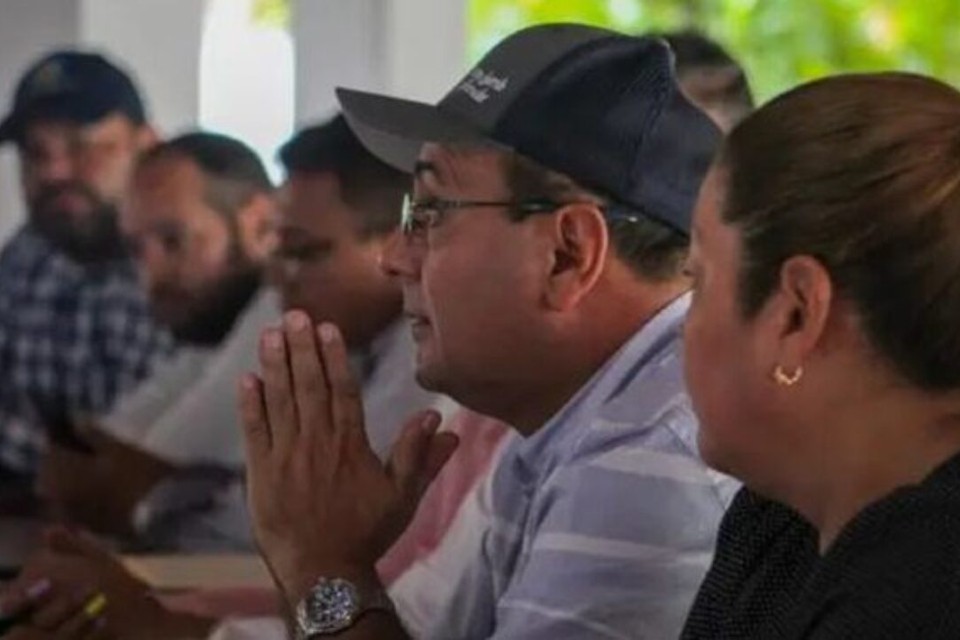The Ministry of Economy, through its different areas, and the Liaison Table of agricultural entities, will begin this Friday “at the last minute” to prepare a schedule of tasks to be solved in terms of the impact of the drought on rural activity in the short and medium term, to meet again on Wednesday, February 1
The announcement was made by the Secretary of Industry, José Ignacio de Mendiguren, at the end of the meeting held by the Minister of Economy, Sergio Massa, and his collaborators with the leaders of agricultural entities.
Massa “convened all the secretariats this afternoon to make, together with the entities, a schedule with the problems that arose so that before the 1st of next month we can be clear about what can be resolved in the short and medium term”De Mendiguren informed the press.
“Today at the last minute is the schedule and there will be extensive work all next week,” added the official, who stated that “all the leaders of the Liaison Table were very satisfied with the meeting” and that “everyone understands that the problem is not the same throughout the country.”
In this sense, he indicated that “problems must be discussed” and gave as an example that “customs problems that are very important for the entry of fertilizers”, for which reason the head of the Federal Administration of Public Revenues was also present at the meeting (AFIP), Carlos Castagneto.
The head of the collecting body clarified that “We are not talking about new taxes, on the contrary, but about seeing how the situation can be alleviated.”
“We are not going to commit to doing things that cannot be fulfilled, we are going to work all week and on February 1 they will be given an answer,” he warned.
He also remarked that the climatic situation is not the same throughout the country and that is why “each of the measures to be adopted must be considered by activity, category and region and the minister will make the final decision.”
“It is important that the provinces and municipalities accompany us, because there are tax issues that are not only at the national level”he said, in addition to remembering that “there is an agricultural emergency in some provinces and the other issues will be resolved next week.”
Who participated in the meeting
In addition to the Ministry of Industry and the AFIP, representatives of the General Directorate of Customs, the Ministry of Agriculture, Banco Nación and the Investment and Foreign Trade Bank (BICE) participated in the meeting.
“I have not seen many times that a government puts all its tools on a table to find a common solution”emphasized De Mendiguren, who pointed out that “all financial, tax, customs issues have been touched on” and, ironically, he maintained that “everything that the Government can do was considered, except making it rain.”
He also stressed that “there was a claim from small and medium-sized producers for the contributions to reach those who truly need it, because there are sectors that have not yet had a very large loss and others for which their lives depend.”
Before the start of the meeting, the Secretary of Industry had indicated that “in this dry season there is no diagnostic uniformity. The amount of soil moisture is not the same in the different regions.”
In this sense, he gave an example of the recent frost situation in Mendoza, where “a concrete survey was made of the damage that had been suffered and, then, measures were taken such as financing that can be paid after the next harvest.”
He also pointed out that “the forecasts we are having about the possibility of rain in the short term” should be taken into account, which, in some cases, will not modify the humidity in the soil while in others it will, as he specified.
“Sometimes it seems that some are happy with a dry spell. It is not the first agricultural emergency in Argentina. The important thing is not to yell at each other because yelling at each other will not solve any problem”he asked.
On the other hand, he questioned those who made “some conditioning statements when asking.”
“The only thing we can do today is get together,” he said.
Bahillo announced aid to Santa Fe ranchers for .300 million
The Secretary of Agriculture, Juan José Bahillo, toured this Thursday together with the governor of Santa Fe, Omar Perotti, productions from the north of the province affected by the droughtand announced the disbursement of 900 million pesos to assist livestock producers, to which another 400 million will be added in the coming weeks.
The national official said that these funds will be administered by the provincial government, which was empowered to allocate them “in the way it best understands.”
Bahillo met with Perotti and the Provincial Production Minister, Daniel Costamagna, at the Las Gamas ranch, located in the Vera department, to analyze the scope of the drought that caused animal deaths due to lack of water and food.
the official announced that the national State will contribute 900 million pesos, of which 400 million pesos are part of the GanAr Plan and the rest to address the most serious situations, especially small and medium producers.
Bahillo recounted the impact caused by the fact of flying over the affected areas together with Perotti and considered that the panorama is “really moving, (it is) distressing to see marshes and lagoons without water; interrupted watercourses, it is hardly imaginable”.
The official reported that the Minister of Economy, Sergio Massa, asked him “to redirect the budgets of some programs that have other objectives, which are noble and valid, but the priority is drought.”
Specifically, Bahillo said that today 500 million pesos arrive in the province, while the 400 million from the GanAr Plan will arrive in the next few days, as well as another 400 million that will be transferred at Massa’s request once the procedures for rigor.
To justify that the funds are distributed by the province, Bahillo said that it is the local officials who “know the territory to assign them effectively and efficiently.”
Regarding the funds, the idea is that those farmers who have up to a thousand bovine heads and a thousand hectares or less access first, while the money from the GanAr Plan will be allocated to producers who have up to 600 animals.
This aid is in addition to that announced by the provincial government, which days ago advanced a series of assistance measures to alleviate the losses caused by the drought.
The Ministry of Production allocated $320 million for the granting of credits at a zero rate.
At the same time that it is analyzed that the Government assumes the cost of carrying water for productions that have less than 400 animals, for a few million, and for those that have less than 50 heads of cattle, subsidies of 0 thousand will be delivered.
Also, A credit line for a total of 0 million was announced for dairy farmers, for a maximum of millions each and a bonus on the interest rate of 15%.
These measures are added to fiscal and tax benefits provided for in the agricultural emergency law, such as the extension of the payment of existing taxes or to be created that tax the patrimony, capital or profits of the affected farms.
In this sense, the AFIP will suspend until the next productive cycle after the end of the period of emergency or agricultural disaster, the initiation of tax execution trials for the collection of taxes owed, among other measures.
.










